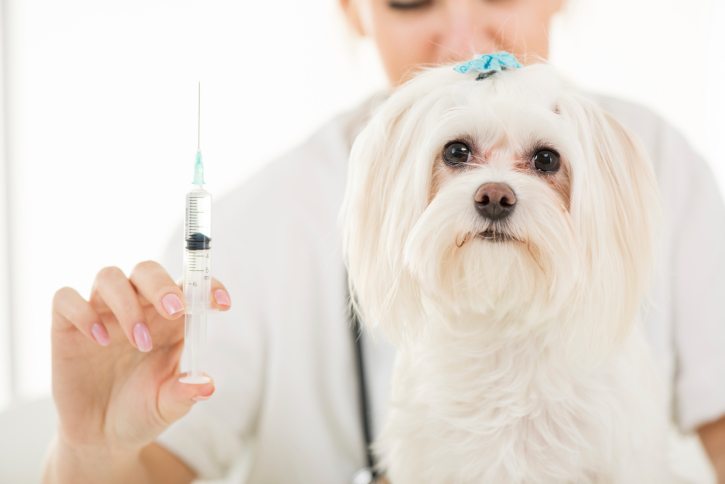There seems to be an ongoing debate among animal scientists as well as pet owners about the fact that we are over vaccinating our pets. The side effects of these vaccines have become so widespread that many pet owners are asking their veterinarian if vaccinations are really necessary. In fact, vaccines can cause some serious allergic reactions and one type of cancer in cats has been linked to vaccinations. Frankly, there is a lot of concern and confusion about over vaccination and here are some answers to consider.
Vaccines were developed for pets to protect them against potentially fatal and contagious diseases. Vaccines are designed to trigger an immune response so the animal can fight off any future infections. Even though many common diseases that are now considered rare, most veterinarians consider vaccines essential and needed.
The Debate Goes On
Some veterinarians recommend yearly shots while others suggest every three years. There are still some that believe vaccines are not necessary after the first year. The problem is that many pet owners are skipping vaccines altogether and this is causing an alarming increase in pet deaths. However, too many vaccines, especially a combination of shots, can attack the immune system, according to Dr. Ronald Schultz, a veterinarian at the University of Wisconsin-Madison, clinical immunology department.
Some vaccines for cats contain a chemical called ‘adjuvant.’ It is being blamed for feline leukemia. Many years ago, veterinarians started noticing that cats were forming tumors between the shoulders, the typical place where cats were vaccinated. Although the tumors are rare, today, most veterinarians vaccinate in the hind legs so in case a tumor develops, they can amputate a portion of the leg and save their life.
According to Dr. Luci T. Dimick, DVM, from Ohio State University, she states that some vaccines can definitely cause cancer. In fact, the immunization used to prevent the feline leukemia virus, is believed to cause cancer.
However, with that said, many people are choosing against vaccinations and that means there is an increased risk for disease. It’s important to note that while some animals are sensitive to them other do not have any reaction. Adverse reactions are usually mild and do not last long.
Major Diseases Pets Face
Dogs face some life-threatening diseases such as distemper that can cause pneumonia, seizures, diarrhea and vomiting. Parvovirus is another one that causes the same symptoms as distemper as well as white blood cell destruction. Parainfluenza can cause kennel cough and is highly contagious. Of course, rabies affects the central nervous system that can actually spread to pet owners. There is no cure for rabies and dogs are euthanized.
Cats can develop feline distemper that causes diarrhea, vomiting, low white blood cell count and dehydration. Feline leukemia and Feline Immunodeficiency Virus (FIV) causes chronic suppression of the immune system that can lead to cancer or the inability to fight off infectious diseases. Runny eyes and nose, fever and fatigue can be cause by a herpes virus.
Is Vaccination Necessary?
Outbreaks of disease are usually caused by exposure to the elements outside, such as water that is contaminated with urine from infected animals including cattle, pigs, rats, deer and horses. It can cause a life-threatening bacterial infection known as Leptospira. If you happen to live on the 3rd floor of a building and your dog is not at risk for contracting kennel cough, unless boarded, then a minimal amount of vaccinations may be sufficient. However, if your dog goes hunting or is around other animals, then additional vaccination is a good idea. The risks verses the benefits must be weighed. Living arrangements and lifestyle play an important role in your pet’s health.
Pet vaccination is such a hot topic in part because the research behind the new vaccines shows that the immunization last longer than one year. In fact, some vaccines have shown to be protective for up to 7 years, however this is not for every circumstance or every animal. Factors that determine a vaccine schedule include the size of the animal, age, lifestyle and health. If your dog spends a lot of time in doggy daycare, kennels or doggie parks, then vaccines are required.
Another Good Option
Another option is to request a ‘titer’ test that determines your pet’s defenses against specific infections. They are blood tests that measure the amount of antibodies in your pet that can fight against various pathogens. In other words, they show the strength of your pet’s immune system retained from any previous vaccinations. The tests are safe, effective and need to be repeated every three years.
Make The Best Decision On Vaccinations
Giving your pet too many vaccines may lead to immune disorders, cancer and allergies. Ask questions before deciding on a vaccine schedule for your pet. Your pet’s vaccine schedule should be based on their size, age, lifestyle and health.
Reviewed and approved by Dr. David L. Roberts, DVM
Photo: Thinkstock


